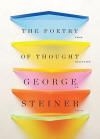The Poetry of Thought
Polymath George Steiner offers up an essay that will, in all likelihood, either send readers into the library stacks with a long list of sources for further reading or drive them away from finishing his text. There are instances here where on a single page, no less than ten names from a diverse range of languages and eras throughout Western thought are bandied about as if Steiner were relaying a conversation with a young child or a walk he takes to the park every day. It’s most likely to be found either hopelessly intimidating or a joke, depending on the temperament of the reader.
Polymath George Steiner offers up an essay that will, in all likelihood, either send readers into the library stacks with a long list of sources for further reading or drive them away from finishing his text. There are instances here where on a single page, no less than ten names from a diverse range of languages and eras throughout Western thought are bandied about as if Steiner were relaying a conversation with a young child or a walk he takes to the park every day. It’s most likely to be found either hopelessly intimidating or a joke, depending on the temperament of the reader.
Steiner understands this. He acknowledges that “In many respects this little book, the interest and focus it hopes for from its readers—statistically a tiny minority—the vocabulary and grammar in which it is set out, are already archaic.” He’s well aware “eight- to eighteen-year-olds log about eleven hours of daily engagement with electronic media. Conversation is face-to-face. Virtual reality occurs within cyberspheres. Laptops, iPods, cell phones, email, the planetary Web and Internet modify consciousness.” These are realities not lost to his own “obsolescent, often technophobic consciousness,” yet he has written this text in the hope of contributing “an attempt to listen more closely” to what, for him, is an endless ongoing conversation between texts.
Not that Steiner is overly generous with explaining anything. There’s a small note on the copyright page: “Publisher’s Note: At New Directions’ request, the author has provided translations of some of the longer passages quoted in the original in The Poetry of Thought.” It appears Steiner would have preferred to leave his readers to fall back on their own means when it comes to his frequent citing of non-English sources. His has been a life of reading and study. The Poetry of Thought wagers a passionate display of erudite reflection upon the nature of poetic use of language in philosophic writings. Steiner’s take is needless to say quite broad:
As Hamlet instructs Horatio, the matter of philosophy is “dreamt of.” Concomitantly there is no literary text, be it a lyric poem, a detective story, a science fiction or romance which does not contain, either declared or veiled, metaphysical coordinates, logical axioms or spoors of epistemology. Man narrates worlds possibly alternative, contrapuntal to his bounded, parochial reality. The philosophic and the poetic are indivisibly conjoined as are “Borges and I” in that parable of mirrors and inevitable duplicity. Both arise from the inexhaustible ubiquity of speech acts.
The above is extracted from his sashaying out the work of Jorge Luis Borges as one example. His garrulousness in citing authors and leaping from one exemplar instance of language use to the next as clarification and further expansion upon his argument doesn’t, however, make him incapable of concision at times:
The point I have been trying to clarify is simple: literature and philosophy as we have known them are products of language. Unalterably that is the common ontological and substantive ground. Thought in poetry, the poetics of thought are deeds of grammar, of language in motion. Their means, their constraints are those of style. The unspeakable, in the direct sense of that word, circumscribes both.
Yet he soon launches off again on an endless sourcing of examples. Steiner has a hard time resisting his own recalling of textual anecdote. For Steiner, the library is such the bustling hive of interconnected argument and jabbering hullabaloo that he can’t resist bringing it all to bear on his argument. Throughout the essay’s progression, Steiner offers his own favorites, spins from off a lifetime’s reading. His remarks on Borges, Husserl, Descartes, Marx, Sarte, Merleau-Ponty, and Wittgenstein are among the many well worth attending to. Throughout, the function and presence of dialogue is of central concern:
The dialogue predates Plato. Aristotle’s dialogues are lost. Of all forms, dialogue comes nearest those ideals of query and refutation, of correction and reprise enjoined by Plato in his critique of writing. Dialogue performs orality; it suggests, even in writing, possibilities of anti-authoritarian spontaneity and fair-play.
Martin Heidegger and Paul Celan, and the mixed-bag role the relationship between language and thought plays in the horrors of genocide, lie at the heart of a discussion which Steiner originally wished to bring forward as an at-once conclusive closure to his argument. It’s an extrapolation upon the meeting-point of Heidegger’s “dichtendes Denken” that is “thought as poetry” with Celan’s reactive, irrevocable “Denkenden” as Steiner relates it: “‘thought in advent,’ beyond any individual speaker. It speaks the speaker.” Steiner is unable to quite achieve what he had originally hoped for, but his discussion of the infinitely expanding conversation between poetry and philosophy and the various figures seminal to his thinking remains compulsively alluring.





